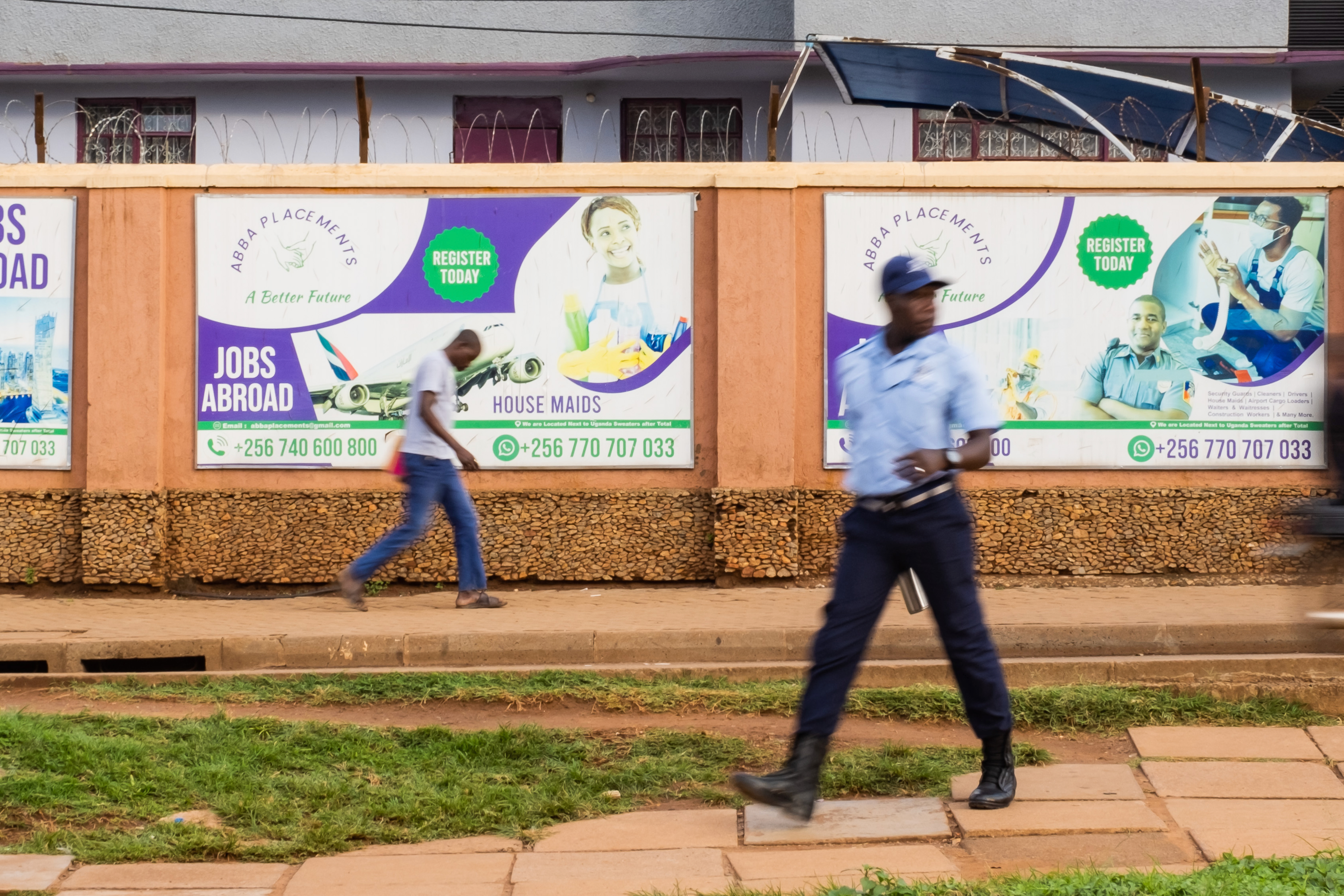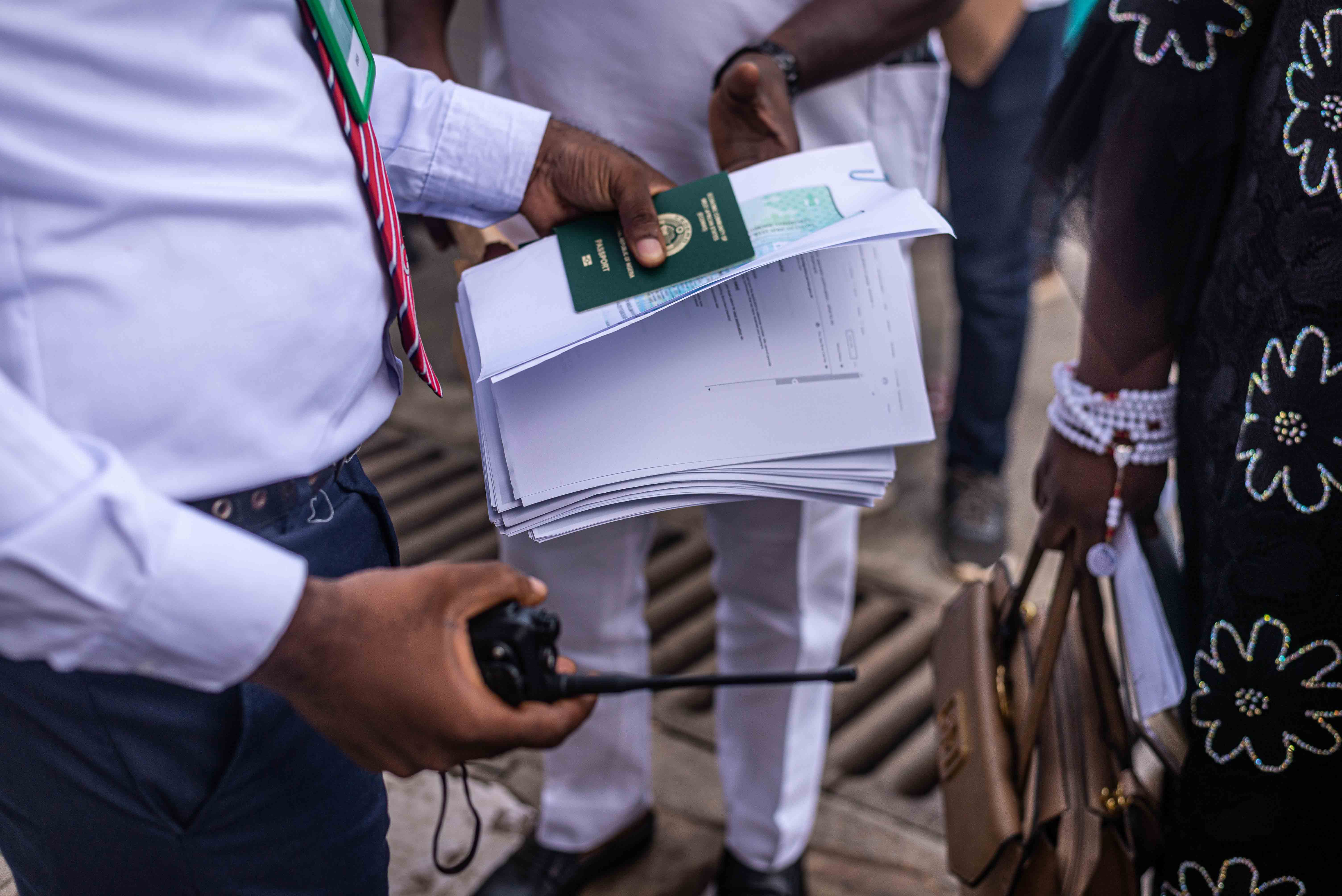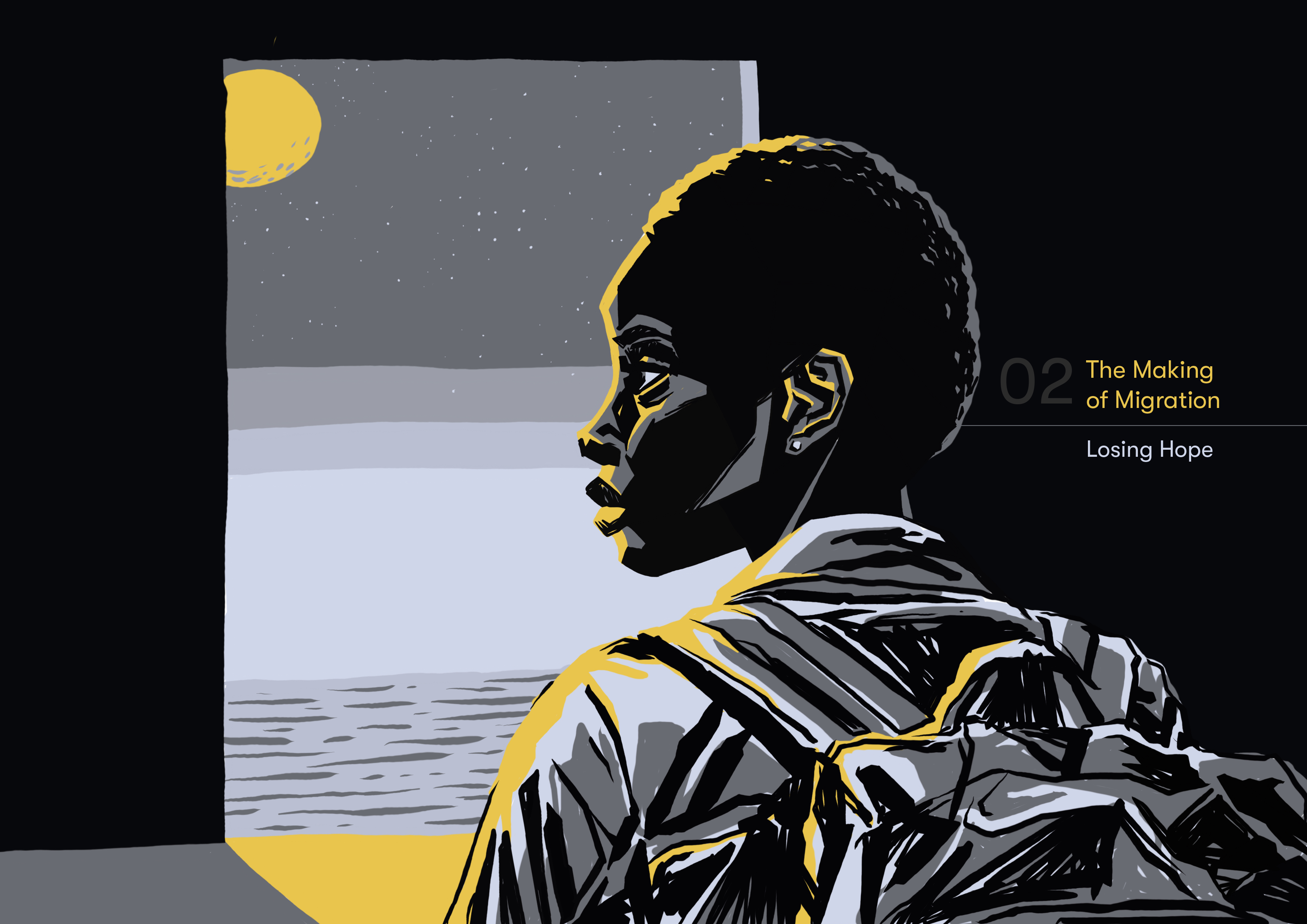• Awareness campaigns about the risks of (illegal) migration, even the risk of dying, have little to no effect
• Aspiring migrants feel sadness about the state of their countries, but have little hope for change as their ruling elites are seen as corrupt and oppressive
• The fact that the overwhelming majority of African migrants remain stuck in miserable conditions in the Gulf, Sahel, and North Africa was also no deterrent for new migrants
In Douala, Cameroon, at the funeral reception for Bryan Achou*, whose drowned body was found in the Mediterranean and returned to his family in November 2022, friends and relatives commiserate about his fate. “He’s a kid from my neighbourhood! In less than two weeks, we lost two children. One was in the ocean between Turkey and Greece, the other was in Tunisia,” a woman exclaims, her face showing disbelief. “Really, before 2035, this country will have been emptied of its citizens,” another mourner replies.
The year 2035 is a reference to the government’s new development paper “Cameroon vision 2025-2035”; an outline of new plans by the 90-year-old autocrat, Paul Biya, to turn his ailing and conflict-ridden nation around. Judging by the resigned reactions to the remark, none of the people here believe that this is likely to succeed. There have been so many plans since Biya came to power in 1982.
Those gathered here – businesspeople, teachers, office workers – are not starving. Nor are they directly affected by the armed insurgency that rages in the western part of Cameroon. But they understand why the youth want to leave, even if it means risking death.
Survivors describe the jungle route as “littered with bodies.”
Shortly after attending Bryan Achou’s funeral, Cameroonian ZAM reporter Elizabeth BanyiTabi hears that a friend, Eva*, plans to leave the country via the American route: flying to Brazil and taking buses north from there, eventually reaching the Panama border jungle called the Darien Gap. From there she’ll have to proceed on foot through hot and thick forest infested with poisonous snakes, spiders, and criminal gangs. Survivors of the 80-kilometre trek through the Gap have described it as “littered with bodies.” Eva knows all this, since a friend of hers died in the Darien Gap not long ago. “Yet, I’ll try,” she says.

Gulf labour
Around the same time, at Entebbe airport in Kampala, Uganda, a human rights worker observes a line of veiled young women seated in the airport’s departure area. They look Ugandan. An immigration officer explains that the group is on its way to Saudi Arabia and other Gulf states to take up jobs as domestic workers.
The activist is perturbed. Many reports say that this domestic worker traffic often lands the recruits in slave-like conditions where they experience long and unsafe working hours, beatings, rape, and even murder. Have these girls missed the numerous radio and news reports in Ugandan media about these Gulf state horror stories?
Digging deeper, ZAM reporter Emmanuel Mutaizibwa – a friend of the human rights worker – finds that many in his country have, in fact, heard the stories, but still elect to go. He interviews Joyce Kyambadde (now 27), who was abused, beaten, and raped, but nevertheless went back to the Gulf for a second domestic work stint in recent years. “You keep thinking that this time you’ll get a salary. There is just barely no hope here (in Uganda),” she says.
According to the Ugandan Bureau of Statistics, at least 41 percent of Uganda’s youth between 18 and 30, a total of around five million young people, are not engaged in any productive activity. Of those who are, in stark contrast to an extremely wealthy governing elite close to the 79-year-old president, Yoweri Museveni, a large portion doesn’t make enough to pay even a very modest rent.
“You keep thinking that this time you’ll get a salary”
Similar stories come from Uganda’s neighbour, Kenya. “It’s like telling a child not to put its hand in the fire, it will still put its hand in the fire,” says Patricia Wanja Kimani, who experienced months of abuse as a domestic worker in the Gulf herself, wrote a book about it, and now works for an NGO that aims to warn young Kenyan women off leaving. Her colleague Faith Murunga, who works at an NGO with a similar mission, admits that Kenya’s youth – of which, according to the Kenyan Federation of Employers 67 percent is unemployed – has few alternatives. Like in Uganda, an extremely wealthy political elite does little to tangibly improve the lot of the majority. “We try to engage with the government (on the issue of prospects for Kenyans). We do what we can,” says Murunga.
The awareness campaigns conducted by the NGO seem to have limited effect. Reporter Ngina Kirori asks ten random women and men in the streets of Nairobi if they are considering going to the Gulf in spite of the well-known horror stories. “I’ll still go because there is no hope here,” say four out of the ten. Two hesitate, telling Kirori that they are very scared, but will still consider it. Only four are sufficiently deterred.
Months after the interview, Patricia Kimani has also left Kenya (in her case, legally) to look for a future elsewhere.
Japa
Those interviewed by ZAM reporter Theophilus Abbah in the Nigerian capital Abuja are builders, plumbers, doctors. Nine out of ten say they also want to “japa”, the Nigerian term for exiting the country, “at the slightest opportunity.” Here, too, interlocutors cite poor governance, the dismal state of health, education and other public services, a massive wealth gap, corruption, and the oppression of media and civil society organisations in the country. “The suffering is unbearable,” says the building contractor, and the plumber sighs that he just feels sad. “I would have loved to stay in Nigeria, if the country worked,” he adds.
Most Nigerians are trying to leave with visas, but many also simply japa illegally, trekking north through the Sahel, hoping to reach the Mediterranean. According to NGOs who work with Nigerian migrants, the overwhelming majority of these never make it to the sea shores, remaining stuck in the Sahel, where they often end up in exploitative labour projects, trafficking and other criminal rings, begging syndicates, brothels, or detention.
“Even those who experienced the hardship go again”
The risks are well-known in Nigeria, just as the dangers of labour traffic to the Gulf are known in Kenya and Uganda, and Cameroonians know they can perish in either the desert, the water, or the jungle. But people continue to leave nevertheless, says Grace Osakue of the NGO Girls Power Initiative, which aims to create small business futures for former and would-be migrants in Nigeria. It doesn’t go so well, she admits, telling Abbah that “even many of those who already experienced the hardship, go again.” This is corroborated by a 2021 report commissioned by the European Union itself, which also estimates that over 60 percent of Nigerian migrants who were “rescued” are “likely to try leaving again.”

Destitute teachers
A whopping 95% of teachers surveyed in November 2022 by the Amalgamated Rural Teachers’ Union of Zimbabwe says that, if given an opportunity, they would go elsewhere. The reason, according to its president Obert Masaraure, is that teachers earn so little that they can’t take care of their families, “not even with food or school fees.” He regards a colleague who made it to Saudi Arabia, he tells reporter Brezh Malaba, as “so lucky.”
“Ruling elites are stripping the nation of all wealth”
It’s not like Zimbabwe is poor: the country boasts some of the world’s richest gold and diamond reserves, not to mention lithium and other minerals that are in demand worldwide. But the proceeds don’t tend to reach state coffers; many reports and documentaries, such as Al Jazeera’s Gold Mafia, have exposed how income is routinely appropriated by prominent individuals in the ruling ZANU PF.
“The ruling elites are stripping the nation of all the wealth,” Masaraure says angrily. “They even facilitate the looting of our natural resources by foreign multinational companies. We as teachers and other professionals are taxed heavily but ministers get salary packages of around US$500,000. We fund their private jets and (other) luxuries.”
When, in recent elections widely seen as fraudulent, ZANU PF wins again, Zimbabwe Twitter is awash with messages that address its southern neighbour South Africa, where president Cyril Ramaphosa has congratulated his counterpart Emerson Mnangagwa with his win. “I congratulate you too; on the number of Zimbabweans coming illegally into your country soon,” one says.
“We congratulate you too on the Zimbabweans coming to your country soon”
An estimated one to two million Zimbabwean immigrants, part of the three to five million Zimbabweans who are living outside their country (out of sixteen million Zimbabwean citizens in total), have come to South Africa in the past decades. Their presence has been the target of political scapegoating by South African populist politicians, who have orchestrated hate campaigns against Zimbabweans, accusing them of criminality. The twitterati in Zimbabwe are well aware of this, referring to the hateful sentiments in their messages. “But we are still coming,” they say. “If you have an opportunity to leave, please do so,” the Newshawks twitter account darkly states after elections results have been made public. “Life is too short.”
Zimbabweans have, in recent years, increasingly been blamed by South African politicians as scapegoats for economic and governance crises in that country. As a result, xenophobia has escalated and reports of violent attacks on foreigners, accused of stealing jobs from locals, are widespread. Remarkably, the South African government has meanwhile failed to fortify its border with Zimbabwe. The flimsy 40-kilometre Beit Bridge border fence — installed at huge cost and exposed as a corrupt moneymaking venture — has already been vandalised. People living on the border have used the material for fences around their own homes.
Every means
In none of the five countries we investigated did the team find anyone who thought that migration away from Africa’s dysfunctional countries could be stopped. In the words of Cameroonian opposition activist Kah Walla: “No one leaves their home if it is comfortable. If I believe for my survival I need to leave my country, I will use every means to do that.” ZAM reporter Elizabeth BanyiTabi herself was urged by a man next to her on a plane from Cameroon to Amsterdam “not to come back.”
Most interviewees, like the ZAM reporters, felt sadness about the state of the places where they were born. But while the reporters still remain committed to their profession, hoping that journalism will, in the end, have some impact, many interlocutors felt powerless to change anything, or “build up their own country”, as those from the West who oppose migration tend to say. “Yes, our country must develop, it needs excellence,” said Dr Ejike Oji, a health sector expert in Nigeria. “So it is sad when our best minds are leaving. But (in the Nigerian system) you will be overlooked, even if you are the most excellent. Excellence is not rewarded here.”
*Names with asterisks have been changed
This investigation was coordinated and edited by ZAM’s investigations editor Evelyn Groenink.
Read all the investigative articles in this series:
• Introduction: Migration is not the West’s problem, it is Africa's
• The full investigation in 4 parts: Losing Hope (Part1), Cash Cows (Part 2), Brain Drain (Part 3), Paying Dictators (Part 4)
• Five Countries: Cameroon, Kenya, Nigeria, Uganda, Zimbabwe
• Essay: The West's Slavery Apology Rumblings Are a Cynical Diversion


